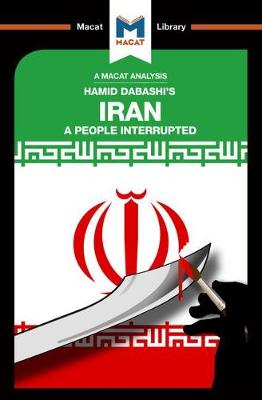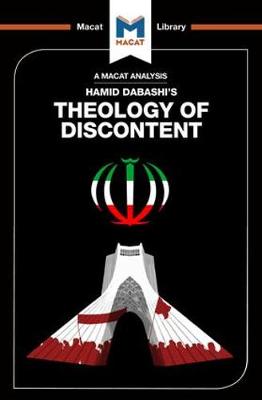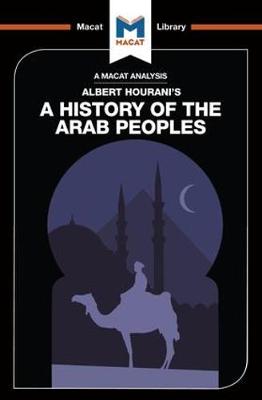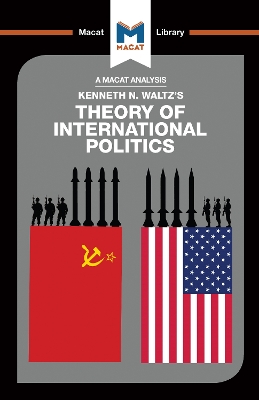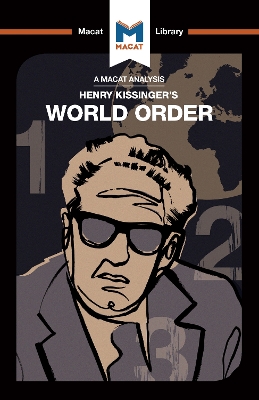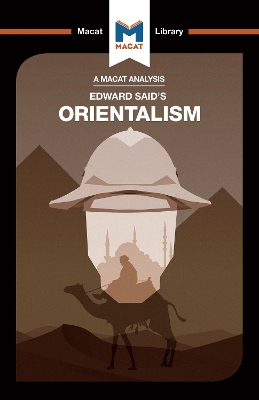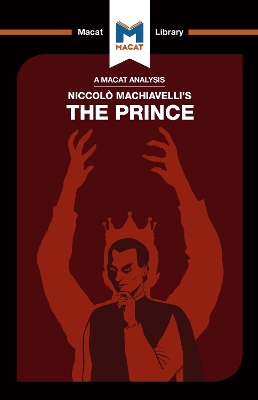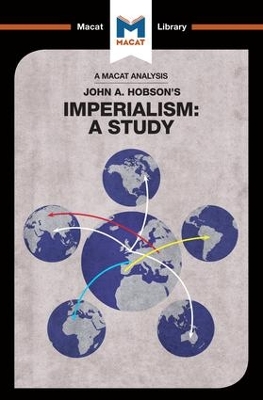The Macat Library
27 total works
Hamid Dabashi's 2007 Iran: A People Interrupted is simultaneously subtle, passionate, polarizing and polemical. A concise account of Iranian history from the early 19th-century onward, Dabashi's book uses his incisive analytical skills as a basis for creating a persuasive argument against the views of Iran that predominate in the...
Read moreHamid Dabashi's 2007 Iran: A People Interrupted is simultaneously subtle, passionate, polarizing and polemical. A concise account of Iranian history from the early 19th-century onward, Dabashi's book uses his incisive analytical skills as a basis for creating a persuasive argument against the views of Iran that predominate in the West.
In Dabashi's view, Western approaches to Iran have been colored time and time again by the assumption that it is somehow trapped between regressive 'tradition,' and progressive 'modernity.' The reality, he argues, is quite the opposite: Iran has its own distinctive ideology of modernity, which is nevertheless opposed to many Western ideals. In order to prove his point, Dabashi draws on a lifetime's experience of literary criticism to analyse the relationship between Iran's intellectual and political elites over two centuries.
His analysis provides the key evidence for his reasoning by teasing out the implicit assumptions that underly the texts and people he examines. Looking beneath the surface of the evidence, Dabashi finds - time and time again - the traces of a uniquely Iranian notion of modernity that is quite at odds with its Western counterpart.
An Analysis of Hamid Dabashi's Theology of Discontent
by Magdalena C. Delgado and Bryan Gibson
Hamid Dabashi's 1997 work Theology of Discontent reveals a creative thinker capable not only of understanding how an argument is built, but also of redefining old issues in new ways. The Iranian Revolution of 1978-9 was front-page news in the West, and in some ways remains so today. Though...
Read moreHamid Dabashi's 1997 work Theology of Discontent reveals a creative thinker capable not only of understanding how an argument is built, but also of redefining old issues in new ways. The Iranian Revolution of 1978-9 was front-page news in the West, and in some ways remains so today. Though it was an uprising against authoritarian royal rule, with a coalition of modernisers and Islamists, the revolution saw the birth of a new Islamic Republic that seemed to reject pro-Western democracy. Dabashi wanted to analyze the real reasons for this change, while examining how Islamic ideologies contributed to the revolution and the republic that followed.
Theology of Discontent examines different Islamic thinkers, analyzing how views with seemingly little in common contributed to the modern Iranian belief system. Beyond its insightful analytical dissection of these eight thinkers, Theology of Discontent also shows Dabashi's creative thinking skills. Reframing the debates about Iran's relationship with the West, he traced the ways in which Iranian identity formed in reactive opposition to Western ideas. In many ways, Dabashi suggested, Iran was trapped in a cycle of deliberately asserting its difference from the West, a process that was fundamental to the development of its own unique brand of revolutionary Islamism.
An Analysis of Albert Hourani's A History of the Arab Peoples
by J. A. O. C. Brown and Bryan Gibson
Few works of history make as well-structured a case for the importance of studying continuity, rather than change, than Albert Hourani's A History of the Arab Peoples.
Hourani's work had three major aims: to refute the idea that Arab society stagnated between 1000 and 1800; to study the...
Read moreFew works of history make as well-structured a case for the importance of studying continuity, rather than change, than Albert Hourani's A History of the Arab Peoples.
Hourani's work had three major aims: to refute the idea that Arab society stagnated between 1000 and 1800; to study the period through the lens of diverse Arab, rather than Muslim, history; and to stress intellectual and cultural continuity. All of these intentions were the product of the author's evaluation of a great mass of secondary sources, many of them devoted to arguing for ideas that contradicted his, and it demanded considerable skill to synthesize from them a coherent and well-evidenced counter-argument.
Hourani was able to do this largely because his grasp of the relevance and adequacy of his predecessors' arguments was second to none; his achievement lies in his ability to reject the reasoning of other historians while still making good use of their evidence. In this task, he was aided by an interpretative skill almost equal to his powers of evaluation; A History of the Arab Peoples is also a monument to the importance of properly understanding the meaning of available evidence.
Kenneth Waltz's 1979 Theory of International Politics is credited with bringing about a "scientific revolution" in the study of international relations - bringing the field into a new era of systematic study. The book is also a lesson in reasoning carefully and critically. Good reasoning is exemplified by arguments...
Read moreKenneth Waltz's 1979 Theory of International Politics is credited with bringing about a "scientific revolution" in the study of international relations - bringing the field into a new era of systematic study. The book is also a lesson in reasoning carefully and critically. Good reasoning is exemplified by arguments that move systematically, through carefully organised stages, taking into account opposing stances and ideas as they move towards a logical conclusion. Theory of International Politics might be a textbook example of how to go about structuring an argument in this way to produce a watertight case for a particular point of view.
Waltz's book begins by testing and critiquing earlier theories of international relations, showing their strengths and weaknesses, before moving on to argue for his own stance - what has since become known as "neorealism". His aim was "to construct a theory of international politics that remedies the defects of present theories." And this is precisely what he did; by showing the shortcomings of the prevalent theories of international relations, Waltz was then able to import insights from sociology to create a more comprehensive and realistic theory that took full account of the strengths of old schemas while also remedying their weaknesses - reasoning out a new theory in the process.
Henry Kissinger's 2014 book World Order: Reflections on the Character of Nations and the Course of History not only offers a summary of thinking developed throughout a long and highly influential career-it is also an intervention in international relations theory by one of the most famous statesmen of the...
Read moreHenry Kissinger's 2014 book World Order: Reflections on the Character of Nations and the Course of History not only offers a summary of thinking developed throughout a long and highly influential career-it is also an intervention in international relations theory by one of the most famous statesmen of the twentieth century. Kissinger initially trained as a university professor before becoming Secretary of State to President Richard Nixon in 1973 - a position in which he both won the Nobel Peace Prize and was accused of war crimes by protesters against American military actions in Vietnam.
While a controversial figure, Kissinger is widely agreed to have a unique level of practical and theoretical expertise in politics and international relations - and World Order is the culmination of a lifetime's experience of work in those fields. The product of a master of the critical thinking skill of interpretation, World Order takes on the challenge of defining the worldviews at play in global politics today. Clarifying precisely what is meant by the different notions of 'order' imagined by nations across the world, as Kissinger does, highlights the challenges of world politics, and sharpens the focus on efforts to make surmounting these divisions possible. While Kissinger's own reputation will likely remain equivocal, there is no doubting the interpretative skills he displays in this engaging and illuminating text.
Edward Said's Orientalism is a masterclass in the art of interpretation wedded to close analysis. Interpretation is characterized by close attention to the meanings of terms, by clarifying, questioning definitions, and positing clear definitions. Combined with one of the main sub-skills of analysis, drawing inferences and finding implicit reasons...
Read moreEdward Said's Orientalism is a masterclass in the art of interpretation wedded to close analysis. Interpretation is characterized by close attention to the meanings of terms, by clarifying, questioning definitions, and positing clear definitions. Combined with one of the main sub-skills of analysis, drawing inferences and finding implicit reasons and assumptions in arguments, interpretation becomes a powerful tool for critical thought.
In Orientalism, the theorist, critic and cultural historian Edward Said uses interpretation and analysis to closely examine Western representations of the "Orient" and ask what they are really doing, and why. One of his central arguments is that Western representations of the East and Middle East persistently define it as "other", setting it up in opposition to the West. Through careful analysis of a range of texts and other materials, Said shows that implicit assumptions about the "Orient's" otherness underlie much Western thought and writing about it. Clarifying consistently the differences between the real-world East and the constructed ideas of the "Orient", Said's interpretative skills power his analysis, and provide the basis for an argument that has proven hugely influential in literary criticism, philosophy, and even politics.
How should rulers rule? What is the nature of power? These questions had already been asked when Niccolo Machiavelli wrote The Prince in 1513. But what made his thinking on the topic different was his ability to interpret evidence: to look at old issues and find new meaning within...
Read moreHow should rulers rule? What is the nature of power? These questions had already been asked when Niccolo Machiavelli wrote The Prince in 1513. But what made his thinking on the topic different was his ability to interpret evidence: to look at old issues and find new meaning within them.
Many of Machiavelli's contemporaries thought that God would make sure morality was rewarded. To these people, it was inevitable that ethical individuals would enjoy success in this world and attain paradise in the next. Machiavelli was not so sure. He used the evidence of history to prove that people who can lie, cheat and murder tend to succeed.
Machiavelli concluded that three main factors affect a political leader's success or failure. In doing so, he reached an entirely new understanding of the meaning of his evidence. Machiavelli argued that behaving in a moral way actually hinders a ruler. If everyone acted morally, he reasoned, then morals would not be a disadvantage. But in a world in which leaders are willing to be ruthless, a moral leader would make both themselves and their state vulnerable. Machiavelli's novel interpretation posits that morals can make a leader hesitate, and this could cost them - and the citizens they are responsible for - everything.
English economist John Hobson’s 1902 Imperialism: A Study was an epoch-making study of the politics and economics of imperialism that shook imperialist beliefs to their core.
A committed liberal, Hobson was deeply sceptical about the aims and claims of imperialistic thought at a time when Britain’s empire held...
Read moreEnglish economist John Hobson’s 1902 Imperialism: A Study was an epoch-making study of the politics and economics of imperialism that shook imperialist beliefs to their core.
A committed liberal, Hobson was deeply sceptical about the aims and claims of imperialistic thought at a time when Britain’s empire held sway over a vast portion of the globe. In order to critique what he saw as a falsely reasoned and immoral political view, Hobson’s book took a cuttingly analytical approach to the idea of imperialism – setting out to dissect and understand the arguments for empire before subjecting them to withering evaluation – a process that led him to the key insight that the then widely-accepted claim that imperialism was essentially a question of nationalism was, in fact, quite weak.
Instead, Hobson’s close analysis of the implicit and hidden reasons for imperialist projects demonstrated that, at root, they were all products of capitalism. It became increasingly clear to him that imperialism was less a political ideology, and more the product of the urgent need to open up new markets and remedy economic stagnation at home.
Deeply provocative at the time, Hobson’s book shows just how powerful the critical thinking skills of analysis and evaluation can be when applied to deconstruction of even the most widely accepted of ideas.
